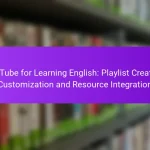Online communities play a crucial role in enhancing English learning by offering interactive platforms for engagement, resource sharing, and real-time feedback. These environments foster collaboration and practice, making language acquisition more effective and enjoyable. When selecting an online community, it’s essential to consider features that promote interaction, accessibility, and support to maximize the learning experience.

How do online communities enhance English learning?
Online communities significantly enhance English learning by providing interactive platforms where learners can engage with others, access diverse resources, and receive real-time feedback. These features create a supportive environment that fosters language acquisition through practice and collaboration.
Interactive language practice
Interactive language practice is a core feature of online communities, allowing learners to engage in conversations, participate in group discussions, and complete language exercises together. This hands-on approach helps reinforce vocabulary and grammar in a practical context.
Many platforms offer features like chat rooms, forums, and video calls, enabling learners to practice speaking and writing in real-time. Engaging with peers in these settings can enhance fluency and build confidence.
Access to native speakers
Access to native speakers is a significant advantage of online communities for English learners. Many platforms connect learners with native speakers who can provide authentic language exposure and cultural insights.
Conversing with native speakers allows learners to hear correct pronunciation, idiomatic expressions, and colloquial language, which are often not covered in traditional learning environments. This interaction can be facilitated through language exchange programs or conversation clubs.
Peer support and motivation
Peer support and motivation are vital components of online communities. Learners can share their experiences, challenges, and successes, creating a sense of belonging and encouragement. This social aspect can significantly boost motivation and commitment to language learning.
Many communities incorporate gamification elements, such as challenges and rewards, to keep members engaged. Participating in group goals or competitions can further enhance motivation and accountability.
Diverse learning resources
Diverse learning resources are readily available in online communities, ranging from articles and videos to quizzes and podcasts. This variety allows learners to choose materials that suit their learning styles and preferences.
Members often share resources, recommend tools, and create study groups, enriching the learning experience. Accessing different types of content can help solidify understanding and make learning more enjoyable.
Real-time feedback
Real-time feedback is crucial for effective language learning, and online communities provide ample opportunities for this. Learners can receive immediate corrections and suggestions from peers or mentors during conversations or written exchanges.
This instant feedback helps identify areas for improvement and reinforces correct usage, making it easier to progress. Engaging in regular practice with feedback can accelerate language acquisition and enhance overall communication skills.

What features should you look for in an online community?
When choosing an online community for English learning, focus on features that enhance interaction, accessibility, and support. Key elements include a user-friendly interface, active member engagement, diverse learning formats, and effective moderation.
User-friendly interface
A user-friendly interface is crucial for facilitating smooth navigation and interaction within the community. Look for platforms that are intuitive and easy to use, allowing learners to focus on their studies rather than struggling with technology.
Features such as clear menus, search functionality, and mobile compatibility can significantly enhance the user experience. Communities that prioritize design often see higher member retention and satisfaction.
Active member engagement
Active member engagement is essential for a vibrant learning environment. Communities with regular discussions, events, and collaborative projects encourage participation and foster a sense of belonging among learners.
Consider communities that offer features like forums, live chats, or group challenges. These elements not only motivate learners but also provide opportunities for real-time feedback and practice.
Variety of learning formats
A variety of learning formats caters to different preferences and learning styles. Look for communities that offer resources such as videos, podcasts, articles, and interactive exercises to keep the learning process dynamic and engaging.
Additionally, platforms that incorporate gamification elements or peer-to-peer learning can enhance motivation and retention. This diversity helps learners to explore English in a way that suits them best.
Moderation and support
Effective moderation and support are vital for maintaining a positive and safe learning environment. Communities should have guidelines and active moderators to ensure respectful interactions and to address any issues that arise.
Access to support, whether through FAQs, live help, or community leaders, can greatly enhance the learning experience. Ensure that the community you choose has a clear structure for providing assistance and resolving conflicts.

Which online communities are best for English learners?
Several online communities cater specifically to English learners, providing diverse resources and interaction opportunities. The best platforms often combine language practice with community support, making learning engaging and effective.
EnglishClub
EnglishClub is a comprehensive platform designed for English learners of all levels. It offers resources such as grammar guides, vocabulary lists, and forums where learners can ask questions and share experiences.
One of the standout features is its community forums, where users can engage in discussions, practice writing, and receive feedback from peers. This interactive element fosters a supportive environment for learners to improve their skills.
Lang-8
Lang-8 is a unique platform that focuses on language exchange, allowing users to write in English and receive corrections from native speakers. This reciprocal learning model encourages users to help others while improving their own language skills.
To get the most out of Lang-8, it’s essential to be active and provide feedback to others. This not only enhances your learning experience but also builds a sense of community among users.
italki
italki connects learners with professional teachers and language partners for personalized lessons. Users can choose from a wide range of tutors based on their teaching styles, availability, and rates, which typically range from low to moderate prices per hour.
Additionally, italki offers a community feature where learners can participate in language challenges and discussions, further enhancing their learning experience. Engaging with both tutors and peers can lead to significant improvements in language proficiency.
Reddit Language Learning
The Reddit Language Learning community is a vast network of language enthusiasts sharing resources, tips, and experiences. Subreddits like r/languagelearning provide a platform for users to ask questions, share study materials, and discuss various learning strategies.
Active participation in discussions can yield valuable insights and recommendations from fellow learners. However, it’s important to verify the credibility of the advice shared, as the community is diverse and opinions may vary.

How do online communities compare to traditional learning methods?
Online communities offer a more interactive and engaging approach to language learning compared to traditional methods. They leverage technology to create collaborative environments, making learning more accessible and tailored to individual needs.
Cost-effectiveness
Online communities often provide a more affordable alternative to traditional language classes. Many platforms offer free resources, while paid memberships typically cost significantly less than in-person courses, which can range from hundreds to thousands of dollars per semester.
Additionally, online resources reduce travel expenses and time commitments associated with attending physical classes. This can lead to savings that allow learners to invest in supplementary materials or tools.
Flexibility and accessibility
Online communities allow learners to engage with content at their own pace and on their own schedule. This flexibility is particularly beneficial for individuals balancing work, study, or family commitments, as they can choose when and how long to participate.
Accessibility is another key advantage; learners can connect with global communities without geographical limitations. This opens up opportunities to practice with native speakers and access diverse learning materials that may not be available locally.
Community-driven learning
In online communities, learners benefit from peer support and shared experiences, which can enhance motivation and accountability. Members often share resources, tips, and feedback, creating a collaborative learning environment that traditional classrooms may lack.
Engaging with a community also allows learners to practice conversational skills in real-time, receive immediate feedback, and participate in discussions that deepen their understanding of the language and culture. This social interaction can significantly enrich the learning experience.

What are the benefits of using online communities for English learning?
Online communities for English learning provide a collaborative environment where learners can practice their skills, receive feedback, and connect with others. These platforms enhance motivation, offer diverse resources, and facilitate real-time communication with native speakers and fellow learners.
Access to Diverse Resources
Online communities often host a variety of learning materials, including videos, articles, and interactive exercises. This diversity allows learners to choose resources that match their individual learning styles, whether they prefer visual aids, reading, or hands-on practice.
Many platforms also feature user-generated content, which can provide fresh perspectives and insights. For example, forums may include discussions on idiomatic expressions or cultural nuances that traditional textbooks overlook.
Real-Time Interaction and Feedback
One of the key benefits of online communities is the opportunity for real-time interaction. Learners can engage in conversations with peers or native speakers, allowing them to practice speaking and listening skills in a supportive setting.
Receiving immediate feedback is crucial for language acquisition. Many platforms enable users to ask questions and get answers quickly, helping to clarify doubts and reinforce learning. For instance, a learner might post a question about grammar and receive prompt responses from experienced members.
Motivation and Accountability
Being part of an online community can significantly boost motivation. Interacting with others who share similar goals creates a sense of belonging and encourages consistent practice. Members often share their progress, which can inspire others to stay committed to their learning journey.
Additionally, many communities offer challenges or group activities that foster accountability. For example, a monthly speaking challenge can motivate learners to practice regularly and track their improvements over time.
Networking Opportunities
Online communities provide valuable networking opportunities for learners. Connecting with individuals from different backgrounds can lead to friendships, cultural exchanges, and even professional opportunities in English-speaking environments.
Participating in discussions or collaborative projects can help learners build relationships that extend beyond language practice. For instance, a member might find a language partner for regular conversation practice or even a mentor in their field of interest.


